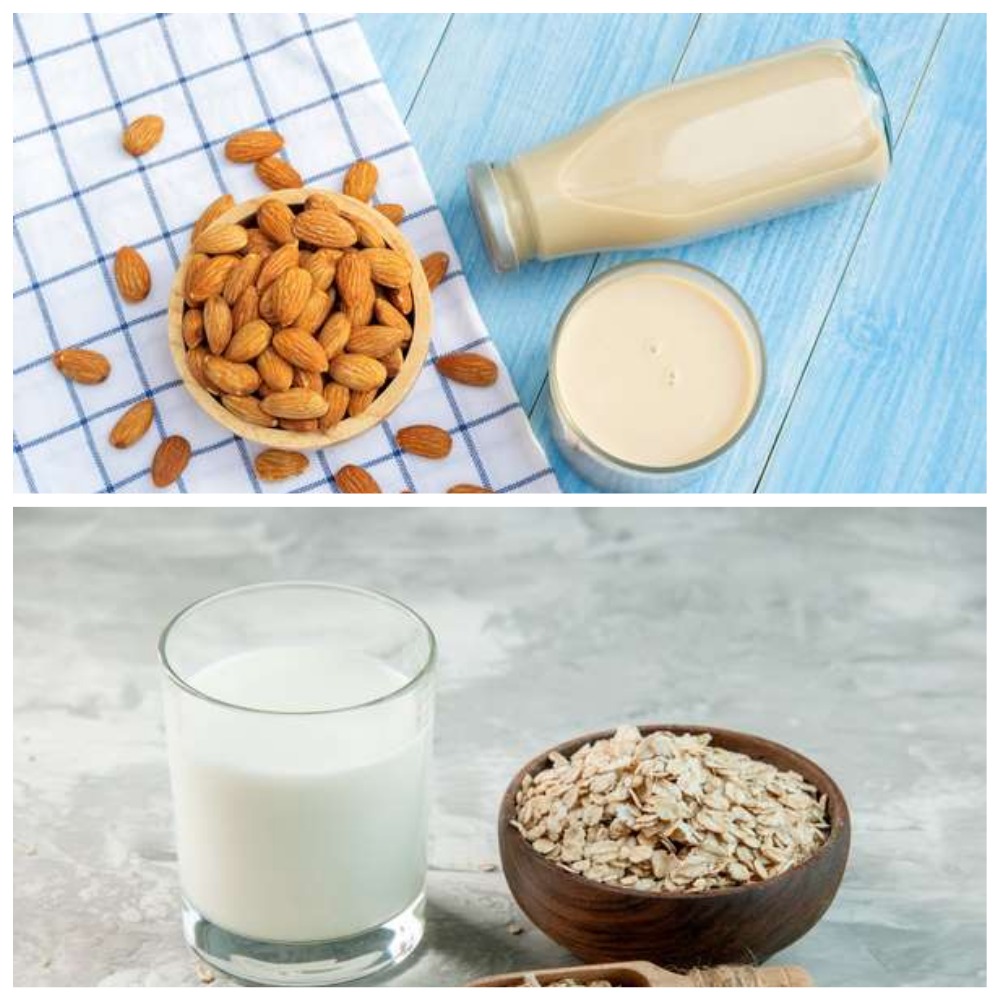Cow’s milk has long been a key element of many diets, as it contains calcium and other essential nutrients. However, with the growing popularity of plant-based diets, people are increasingly choosing non-dairy drinks such as oat or almond milk.

Oatmeal and almond milk are free of lactose and animal proteins, making them excellent options for vegans and people with lactose intolerance or other reactions to dairy products.
In addition, some research suggests that consuming plant-based milk may have some health benefits and be more environmentally friendly than animal milk.
Nutritional comparison
The different types of oats and almond milk provide a wide range of nutrients. In many cases, one 8-ounce serving can meet a portion of the recommended daily value (DV). Here’s a comparison chart for an 8-ounce serving of oat milk and almond milk:
| Nutritional value | Oat milk (8 oz) | Almond milk (8 oz) |
|---|---|---|
| Calories | 79 | 29 |
| Carbohydrates | 14 г | 1 г |
| Protein | 4 г | 1 г |
| Fats | 1,5 г | 2,5 г |
| Fibre | 1,9 г | 1 г |
| Sodium | 120 mg (5.2% DV) | 189 mg (8.2% DV) |
| Calcium | 19.2 mg (1.9% DV) | 451 mg (45% DV) |
| Vitamin D | 0 IU (0% DV) | 101 IU (16.8% DV) |
| Iron | 0.72 mg (9% DV) | 1 mg (12.5% DV) |
| Potassium | 170 mg (5% DV) | 93.6 mg (2.8% DV) |
Both drinks are considered low in calories and enriched with vitamins and minerals compared to cow’s milk. At the same time, oatmeal milk has slightly more calories, carbohydrates and protein, while almond milk contains slightly more fat and sodium. Almond milk also has a higher calcium content.
Some manufacturers additionally fortify plant milk, so the level of nutrients can vary depending on the brand. For example, almond milk doesn’t usually contain vitamin D naturally, but it may be added during production. If you need additional vitamins and minerals, choose fortified oat or almond milk.
Benefits of oat milk
Oat milk is made by mixing oats with water and straining the mixture. This drink has several positive qualities:
- Absence of lactose and animal ingredients. It is suitable for vegans and people with lactose intolerance.
- Rich in beta-glucan, a fibre that helps regulate cholesterol levels, promotes stable blood sugar levels and slows the digestive process.
- It can be enriched with essential nutrients. Many brands add calcium, vitamin D and phosphorus.
- Creamy texture and mild flavour: Ideal for coffee drinks, baking or smoothies.
- Environmental sustainability: Oat milk requires less water and land than cow’s and almond milk.
Disadvantages
- Higher carbohydrate content. This can be a problem for people with diabetes or those who closely monitor their blood sugar.
- It often contains added sugars, which increases the glycaemic index of the drink.
- Lower in protein and fat than cow’s or soya milk.
- Potentially more challenging to digest due to insufficient amounts of the amino acid lysine, as well as phytates and oxalates, which can make it difficult to absorb minerals.
Benefits of almond milk
Almond milk is usually produced by soaking almonds in water, grinding them and then straining them. It has the following benefits:
- Low-calorie content (especially unsweetened varieties). It can be helpful for people seeking to control weight.
- Lack of cholesterol and lactose: Suitable for people with lactose intolerance and those who avoid cholesterol for health reasons.
- Healthy fats: Contains monounsaturated fatty acids that promote heart health and weight control.
- Almonds are a good source of minerals. They are rich in calcium, phosphorus, and vitamin E, which can also be added to the finished product.
- Compared to cow’s milk, almond production requires less land and produces fewer greenhouse gas emissions, although it may need more water.
Disadvantages
- Low protein content: The body finds it more difficult to get the required amount of protein from almond milk alone.
- Different fortification from brand to brand: Some manufacturers add vitamins and minerals in various proportions, and unfortified versions contain significantly fewer nutrients than cow’s milk.
- Additional ingredients: Sweeteners, thickeners, and preservatives can affect the final nutritional value.
- Allergic reactions are possible. Almond milk is contraindicated for people with nut allergies.
Which is better for weight loss?
Both drinks can help you lose weight, as they are low in calories and have some metabolic benefits. The choice depends on your personal goals and health:
- Almond milk has a lower calorie count, which is attractive to those on a restricted-energy diet.
- Oat milk is higher in fibre, which improves digestion and prolongs the feeling of fullness, reducing the risk of overeating.
To lose weight, you should also pay attention to your overall diet to prevent vitamin and mineral deficiencies.
Which is more environmentally friendly?
In general, most plant-based milk is less harmful to the environment than cow’s milk because it has a smaller carbon footprint and uses less land and water.
Oat milk usually uses less water than almond milk. However, both types are still more environmentally friendly than traditional cow’s milk.
How to use plant milk
Plant-based alternatives can differ in taste and texture from cow’s milk, so it’s worth considering this in your cooking. Here are some tips:
- Add to your coffee or latte for a pleasant creamy taste.
- Mix with protein powder for a healthy shake.
- Make smoothies with fresh or frozen fruit.
- Use in baking (muffins, cakes, cookies).
- Suitable for making sauces, marinades and stews.
- Add to creamy soups, curries or mashed potatoes.
Which is healthier?
The final choice between oat and almond milk depends on your personal nutritional needs and the absence of allergies:
- Oat milk is richer in fibre (especially beta-glucan), which benefits the cardiovascular system and digestion. It is also safe for people with nut allergies.
- Almond milk is usually lower in calories, contains healthy fats and can be rich in trace elements (if fortified).
In any case, milk is only one component of the diet. If you have a chronic medical condition or special dietary needs, consult a registered dietitian to help determine your best option.
Bottom line.
With the growing popularity of a plant-based lifestyle, oat and almond milk are great alternatives to cow’s milk.
- Oat milk is higher in fibre and has a pleasantly thick consistency.
- Almond milk has fewer calories and may contain more vitamins and minerals in fortified form.
Choose the option that best suits your individual nutritional needs and preferences, considering possible allergies and overall dietary balance.






